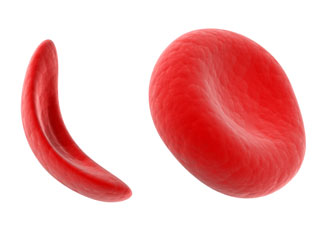
Sickle Cell Disease Treatments
Treatment includes avoiding crises, relieving symptoms and preventing complications
Find out if you are at risk - get tested
| Test Type | Testing Time | Fee |
All orders received before 3pm PST / 6pm EST are shipped out the same business day. All orders received after 3pm PST / 6pm EST or on weekends or holidays are shipped out the following business day. 24/7 online status check and account management available for all tests.
Sickle cell anemia treatment involves measures to avoid crises, relieve symptoms and prevent complications.
Medications
Medications used to treat sickle cell disease include antibiotics, pain-relievers and hydroxyurea. Individuals with sickle cell disease are prone to infections which can be managed through antibiotics. Children with sickle cell disease take the penicillin antibiotic from 2 months of age to until at least 5 years of age to prevent infections such as pneumonia. During pain crises, over-the-counter pain medications can be used to manage pain. Hydroxyurea stimulates the production of fetal hemoglobin and when taken daily it can reduce the number of painful crises, as well as decreasing the need for blood transfusions. People affected by sickle cell disease should also take folic acid supplements, which help in the production of new red blood cells.
Blood Transfusions
Blood transfusions are used to treat people with severe sickle cell disease, as transfusions increase the amount of normal red blood cells and relieve anemia. The blood hemoglobin level of a person with sickle cell anemia is generally between 6 to 8gm/dl (normal levels are above 11gm/dl). Transfusions are often used in extreme conditions when there are severe drops in a patient’s hemoglobin levels. They are also used for patients with other complications such as pneumonia, stroke, pregnancy, and severe leg ulcers. A red blood cell exchange, where sickled blood cells are removed and replaced with normal red blood cells can be performed when sickle cell disease is so severe that other forms of treatments are not helping. Risks associated with transfusions include infections, immune reactions and organ damage from iron overload. Iron chelators, such as deferasirox, can be used to lower iron levels.
Additional Treatments
During pain crises or when acute chest syndrome is detected, providing supplementary oxygen can help. Pain crises are triggered by dehydration, infection, injury, exposure to cold, emotional stress and strenuous exercise. Therefore preventative methods include drinking plenty of fluids, avoiding extremes of heat and cold and careful monitoring during exercise. Intravenous fluids may be provided to reduce dehydration. Often, clotrimazole, (an antifungal which reduces the risk of infections), and magnesium are provided along with the fluids. Joint inflammation can be treated with anti-inflammatory medications such as ibuprofen. Vaccinations are highly recommended to protect against common infections, such as influenza. Counseling for psychological complications is often also required.
Bone Marrow and Stem Cell Transplants
Stem cell transplants are the only cure for sickle cell disease and patients who survive stem cell transplants are usually completely cured of sickle cell disease. Complications associated with this procedure include finding matching donors and high risk of death (5%-10%).
Monitoring
Patients with sickle cell anemia should be monitored through hematological evaluations every 6 to 12 months, especially for iron overload. The growth and development of children with the disease should also be closely monitored.
Next, About the Sickle Cell Genetic Test »
Sickle cell anemia (last updated 24th Feb 2014). Medline Plus, National Institutes of Health.
Rees DC, Williams TN, Gladwin MT (2010). Sickle-cell disease. The Lancet, 376(9757): 2018-2031.
